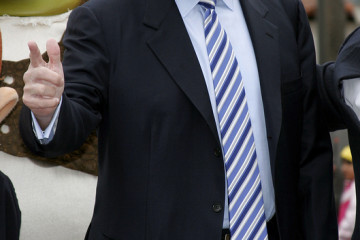Emerging-Market Stocks Drop on Crude Slump, China Growth Concern

©2015 Bloomberg News
NZ27F36JIJUX
NZ27F36JIJUX
(Bloomberg) — Emerging-market stocks fell for a fifth day, led by raw-material and energy producers, as crude prices plunged to the lowest since 2009 and Chinese trade data underscored concern that global growth is slowing.
The Bloomberg Gulf Cooperation Council 200 Index tracking companies in the oil-exporting Arabian Gulf dropped 2.4 percent to the lowest level since May 2013. The Shanghai Composite Index slid the most in a week after data showed China’s exports fell for a fifth month. A gauge tracking 20 developing-nation currencies fell to a record for a second day, led by Malaysia’s ringgit. Brazilian commodity exporters paced a 1.7 percent decline in the Ibovespa, while the real weakened for a second day.
“The outlook for emerging markets has worsened again with new evidence of an acceleration of capital outflows,” said Maarten-Jan Bakkum, a senior emerging-markets strategist at NN Investment Partners in The Hague. “I recommend being very cautious on all emerging-market assets, particularly currencies.”
Sentiment toward riskier assets soured this week after the OPEC effectively dropped formal output targets on Friday, stoking concern producers will pump more crude into an oversupplied market. The move is adding to selling pressure as the Federal Reserve prepares to end a seven-year era of near- zero interest rates. Brent crude dipped below $40 a barrel on Tuesday for the first time in almost seven years before settling at $40.26.
Annual Slump
The MSCI Emerging Markets Index dropped 1.5 percent to 795.46. Raw-material stocks led the decline, slumping 2.4 percent, followed by a 2 percent drop in energy shares. The MSCI gauge’s 2.3 percent drop in December has dragged its 14-day relative strength index to 31.6, just above the threshold of 30 that signals to some traders that a security is poised to rebound.
Emerging-country stocks are on course for their worst annual slide since 2011, under-performing developed-nation peers on the MSCI World Index in large part due to the prospect that the Fed will start increasing interest rates gradually. Tighter U.S. policy will damp the allure of the higher returns offered in less-developed countries. Futures traders put the probability of a Fed rate increase this month at 80 percent.
Mideast, Europe
Among energy shares, Cnooc Ltd. was the biggest drag on emerging-market stocks with a 3.5 percent decline in Hong Kong, while Sasol Ltd sank 3 percent in Johannesburg. Lukoil PJSC retreated 1.3 percent in Moscow.
Qatari stocks and shares in Dubai retreated at least 3 percent. The lack of any limit on OPEC may lift the lid on millions more barrels of additional supply in 2016 from countries including Iran, which is seeking to reclaim market share when sanctions are lifted.
The Hang Seng China Enterprises Index of mainland Chinese stocks listed in Hong Kong fell 1.4 percent, weighed down by declines in insurers. PICC Property & Casualty Co. slumped the most in five months after American International Group Inc. sold 361 million shares in the company.
In emerging Europe, the WIG 20 Index in Warsaw sank 2.7 percent to the lowest level since July 2009. The Micex Index retreated for a third day in Moscow, dropping 1.3 percent. The ruble added 0.1 percent from the lowest level against the greenback since August.
A gauge tracking 20 emerging-market exchange rates against the dollar weakened 0.2 percent. The yuan lost 0.15 percent after the People’s Bank of China lowered the reference rate by 0.15 percent to 6.4078 against the greenback, the weakest since Aug. 27.
The ringgit depreciated 1.1 percent, halting a three-day gain, as the drop in crude prices damped the outlook for the nation’s finances just as Prime Minister Najib Razak flagged a 30 billion ringgit revenue shortfall in 2016 due to oil.
The premium investors demand to hold emerging-market debt rather than U.S. Treasuries widened two basis points to 402, according to JPMorgan Chase & Co. indexes.
–With assistance from Elffie Chew, Lilian Karunungan and Choong En Han.
To contact the reporter on this story: Natasha Doff in London at ndoff@bloomberg.net To contact the editors responsible for this story: Daliah Merzaban at dmerzaban@bloomberg.net; Richard Frost at rfrost4@bloomberg.net Richard Richtmyer







No Comment